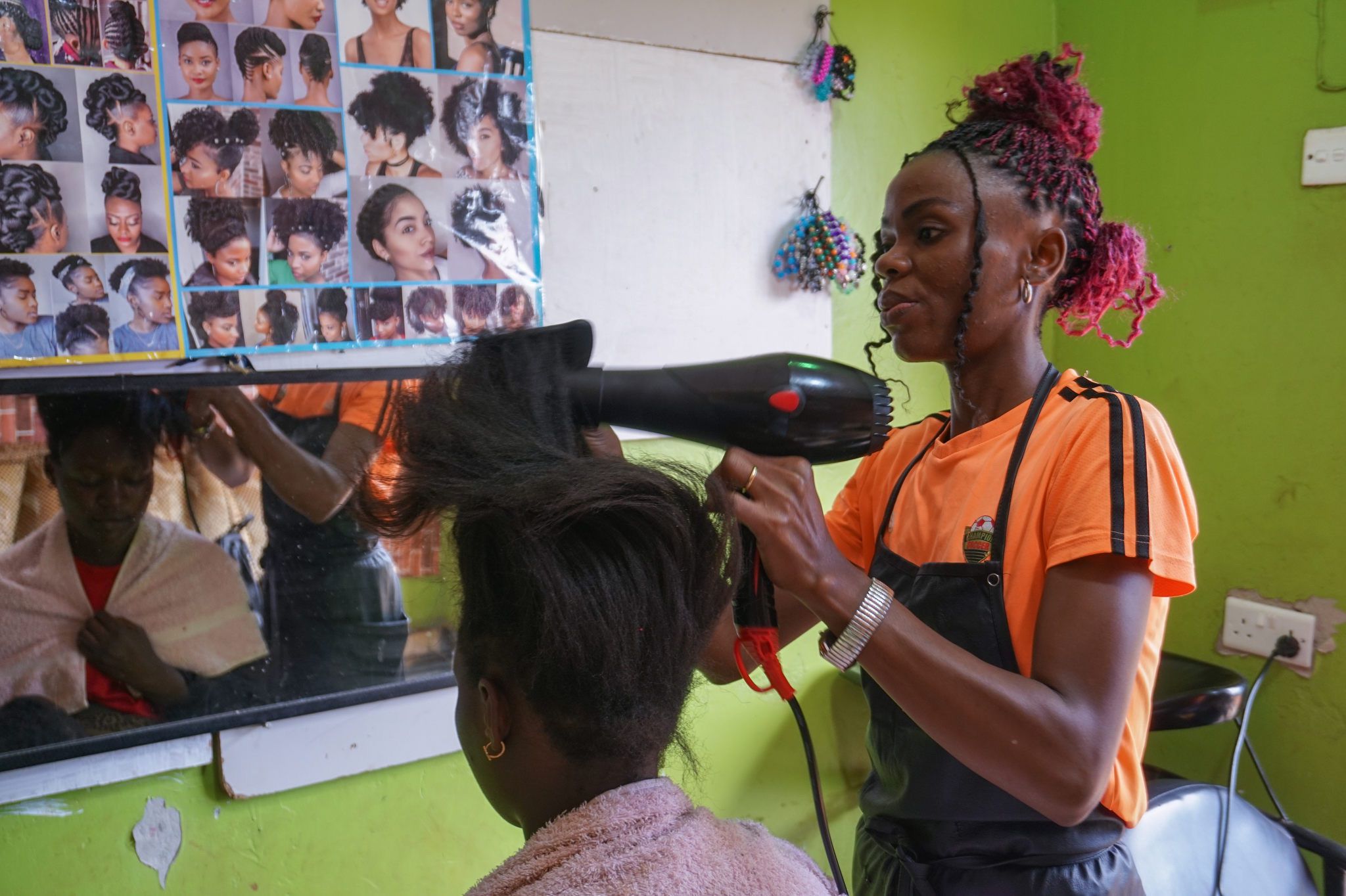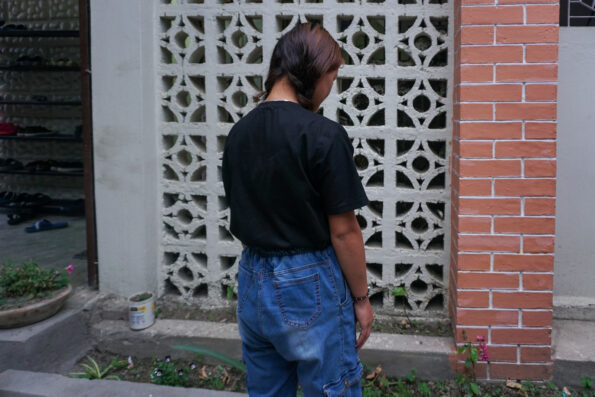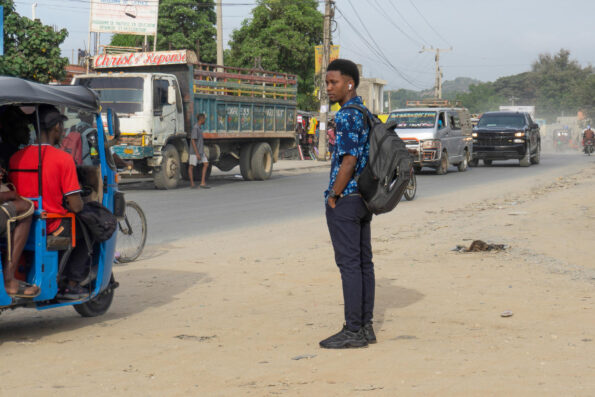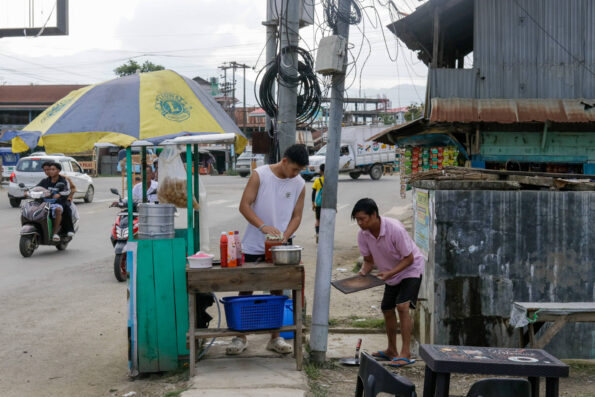
Patricia Lindrio, GPJ Uganda
Sangara Bahizire, who was an attorney in Democratic Republic of Congo before he fled to Uganda for his safety, now works occasionally as an interpreter. He is looking for new work opportunities daily.
KAMPALA, UGANDA — Sangara Bahizire occasionally works as a French, Lingala and Swahili interpreter for the Ugandan Judiciary.
Until 2013, Sangara had spent three years practicing as an attorney in Bukavu and Goma in his native Democratic Republic of Congo before fleeing to Uganda due to threats on his life.
Sangara recalls the incident, in August of that year, that changed his life.
“Government soldiers came to my house and tortured me in front of my family for defending a group that was allegedly supporting rebels. I was threatened and later transported to an unknown location and tortured,” he says.
Sangara has no recollection of what happened after his abductors released him, only that he woke up three months later at a hospital in North Kivu province, critically ill.
“My doctor informed me that two good Samaritans found me by the roadside and brought me here,” he says. After he stabilized, the doctor arranged for his travel to Uganda.
Sangara is one of the more than 1 million refugees living in Uganda after fleeing conflict in their countries. Their refugee status, however, makes it difficult to acquire gainful employment despite their skills and qualifications. A lack of harmonization of the laws governing refugees’ right to work also does little to help matters.
The Refugees Act 2006, for instance, promotes the inclusion of refugees in Uganda’s economy through the self-reliance approach, which enables them to work and start businesses, just like locals. But the Employment Act, the law governing employment, does not include refugees as workers, thus denying them equal opportunities to compete with locals in the job market. Proposed laws like the Employment Amendment Bill 2022, passed by the Ugandan Parliament in May to improve the Employment Act, also do not recognize refugees as workers, making it even harder for them to penetrate the labor market.



In Uganda, Sangara took a three-month course in English to boost his chances of finding a job. Since he couldn’t return to school, he tried to get qualified by the Uganda Law Council, the regulatory authority for the legal profession, but found out Congolese documents weren’t recognized.
“I spent 17 years of my life at school. It was not my will to come here. I wish people can understand that refugees come with their level of education,” he says.
Although a recommendation from a colleague got Sangara a chance to work as an interpreter at the judiciary, the infrequency of the work means he has no stable income.
“I have asked for an employment contract in vain. The reason given was that there aren’t enough cases requiring translation to formalize my employment,” Sangara says.
The Refugees Act 2006 states that refugees have the right to access employment opportunities and practice in a profession for which they are qualified, on the basis that they will receive the same treatment as Ugandans. But David Waiswa, director of the Center for Community Development and Peaceful Coexistence, a nongovernmental organization that provides services and support to refugees, says they remain marginalized. He says proposed laws, like the Employment Amendment Bill 2022, need to explicitly mention refugees to avoid complications like their being categorized as migrant workers.
A 2021 study by the International Labour Organization reviewed the Ugandan law with regard to refugees’ employment rights. According to the study, refugees’ rates of participation in the labor force are lower than those of the general population, with refugee unemployment in Uganda estimated at 72%. Those finding employment often end up in the informal sector, working longer hours and earning wages that are 35% to 45% lower than Ugandans’.
“As a refugee, I am looked at as a helpless person who needs aid. I understand that nationals also find it hard to find work, but how about having a chance to rightly compete for the same jobs?” Sangara says.
Joyeux Mugisho, the executive director of People for Peace and Defense of Rights, a refugee-led organization focusing on advocacy and livelihood, says refugees in Uganda face several challenges in accessing employment opportunities. The major ones are recognition of their documents, such as the refugee identity card and foreign academic credentials. Lack of work permits and discrimination by some employers is also a problem for many.



Uganda hosts the largest refugee population in Africa, with nearly 1.6 million refugees as of July. The majority come from South Sudan (57%) and DRC (32%) as a result of long-running conflicts in the neighboring countries.
Although the country has a progressive refugee regimen — the Refugees Act 2006 and Refugee Regulations 2010, which includes specific guidelines for the act — that offers a good basis for refugee inclusion, allowing them to participate in economic opportunities, its implementation has been low.
“There is a lack of synergy with the law to enable responsible sectors to pick up from what the Refugee Act spells out,” says Stephen Opio, chief technical adviser at the International Labour Organization.
Waiswa says it is not clear under which circumstances refugees may work, given that they do not enter the country in search of employment.
He says laws like the Employment Act restrict the hiring of refugees in Uganda as migrant workers.
Waiswa proposes special consideration of refugees, given the nature of their migration, by cross-referencing the Refugees Act and the laws governing their employment in Uganda, to make them uniform.
In 2021, the United Nations High Commissioner for Refugees reported that only 29% of refugees in Uganda had active jobs, compared with 64% of the local population. Refugees also had a 35% lower chance of being employed than Ugandans.
Scoline Bushiri Mangaza is a qualified Congolese teacher. After failing to find a teaching job, even within her refugee community, she got work as a waitress, working from 5 a.m. to 9 p.m.
“While I was happy to have a job, daily insults about my refugee status and difference in pay with my Ugandan workmates was demotivating,” says Mangaza.
Whereas her colleagues earned 5,000 Ugandan shillings (about 1.30 United States dollars) daily, Mangaza was paid 3,000 shillings (80 cents) for the same job. She quit because of the stress.
Renine Mufalume Matiso, 26, decided self-employment was the way to go after facing prejudice working as a shop attendant and hairstylist. “I always got the job, but some days into it, I was asked to leave with no explanation,” she says. This made her feel unwanted and unappreciated.
“I know that I have the talent, but it was never respected,” says Matiso, who decided to start a salon with other Congolese refugees because of the frustration.
Waiswa says it’s important to advocate for attitude change among local governments and potential employers regarding refugees’ right to decent employment.
Milton Turyasiima, assistant commissioner for employment services at the Ministry of Gender, Labour and Social Development, acknowledges that employment remains a big challenge for both employers and refugees.
“There is need for more sensitization when it comes to the employment of refugees. Asking for work permits is not right,” he says.
Turyasiima says the ministry, in collaboration with other organizations, has developed a livelihoods program for refugees and host communities. The Prospects Program 2019-2023 aims to improve participants’ skills and access to employment.
Opio, whose organization is among those working with the government to line up jobs for refugees, explains why the groups chose this approach.
“When we realized that there is a problem around work permits and access to jobs for refugees, we decided to partner with the government and other organizations toward creating employment for refugees,” Opio says. One such program, he adds, is apprenticeship in the hotel sector, where 315 refugees have participated, with positive returns.



Johnathan Fataki, a Congolese man, got a job as a chef at a Kampala hotel upon completing his training through the program.
When the apprenticeship program was advertised, Fataki’s friends told him not to bother applying because “they usually pick Ugandans,” he says. But he applied anyway and is glad he took his chances because the program has transformed his life.
From being a bricklayer in the Nakivale refugee settlement, in Isingiro district, in western Uganda, Fataki now has a stable job at one of the country’s biggest hotels, with a contract he hopes to renew for a year after completing his first six months.
“I can pay my rent and support my siblings through school. I am very excited about the future. I want to study more, gain more experience and become the head chef,” Fataki says.
Mugisho says the government has been good to refugees by providing a safe place when they had nowhere else to go. However, he says it is necessary to ensure that what is written in law is put into action.
“International and local organizations have a big role to play in ensuring that refugees are given space to show their capacity and knowledge. This should start by empowering some refugees in higher positions in organizations because it has been observed that they only employ refugees for incentive jobs,” he says.
For Sangara, the next step toward achieving his dream of practicing law in Uganda is taking advantage of the free service provided by the government to have his academic qualifications recognized by the National Council for Higher Education.
“I want to go back to school and do the bar course because when I see my fellow lawyers working in court, it hurts because I know I can do the same job given the opportunity,” he says.
Patricia Lindrio is a Global Press Journal reporter based in Kampala, Uganda.







